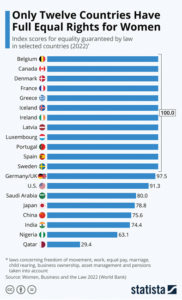
Ms. President
In May 1872, Ohio native Victoria Woodhull was chosen as the presidential candidate for the Equal Rights Party before 668 delegates. She was the first woman ever chosen by a political party to run for president, but her presidential bid soon floundered. Woodhull was on record as being an advocate of free love, which opponents argued was an attack on the institution of marriage. For Woodhull, it had more to do with the right to have a relationship with anyone she wanted. Rather than debate her publicly, her opponents made personal attacks. Some called her a witch, while others said she was a prostitute. In fact, the very idea of a woman even casting a vote for president was considered scandalous at the time.
That year, Woodhull caused an uproar when her newspaper ran an exposé about the infidelities of one of her detractors, Henry Ward Beecher. Woodhull and her sister were imprisoned and accused of publishing libel and promoting obscenity. They spent election night of 1872 behind bars as incumbent Ulysses Grant defeated Horace Greeley for the presidency.
Known for her passionate speeches and fearless attitude, Woodhull was a trailblazer for women’s rights. She advocated revolutionary ideas, including gender equality and women’s right to vote. “Women are the equals of men before the law and are equal in all their rights,” she said. America, however, wasn’t ready to accept such radical ideas.
Source: The Book of Unusual Knowledge
The Status of Equal Rights for Women Around the Globe
There are only 12 countries in the world that offer full legal protections to women, according to a report titled “Women, Business and the Law 2022,” recently published by the World Bank. Those countries that offer full equal rights for men and women, at least from a legal perspective, include Belgium, Canada, Denmark, France, Greece, Iceland, Ireland, Latvia, Luxembourg, Portugal, Spain and Sweden. 
Spain and Greece are the newcomers, among those rated at 100 points this year. Both countries equalized parental leave entitlements between the sexes. Of the world’s 194 countries, 98 ranked at 80% or above, up from 94 in 2021. Saudi Arabia, which came in last as recently as 2019, has improved its score considerably, following new laws implemented in the country, ranking in now at 98 at 80%. The last place in the ranking went to Yemen (26.9%).
The United States ranked 91.3% below countries such as Peru and Albania. It lost points because of a lack of laws guaranteeing equal pay and equal pensions in addition to having notoriously bad laws around parental leave.
Japan and South Korea ranked at approximately 79% and 85%, respectively, losing most points for the quality of laws concerning equal pay, family and entrepreneurship. What’s more, Japan only achieved 50% of the score for workplace equity, which includes other areas such as equal hiring, workplace discrimination and sexual harassment.



